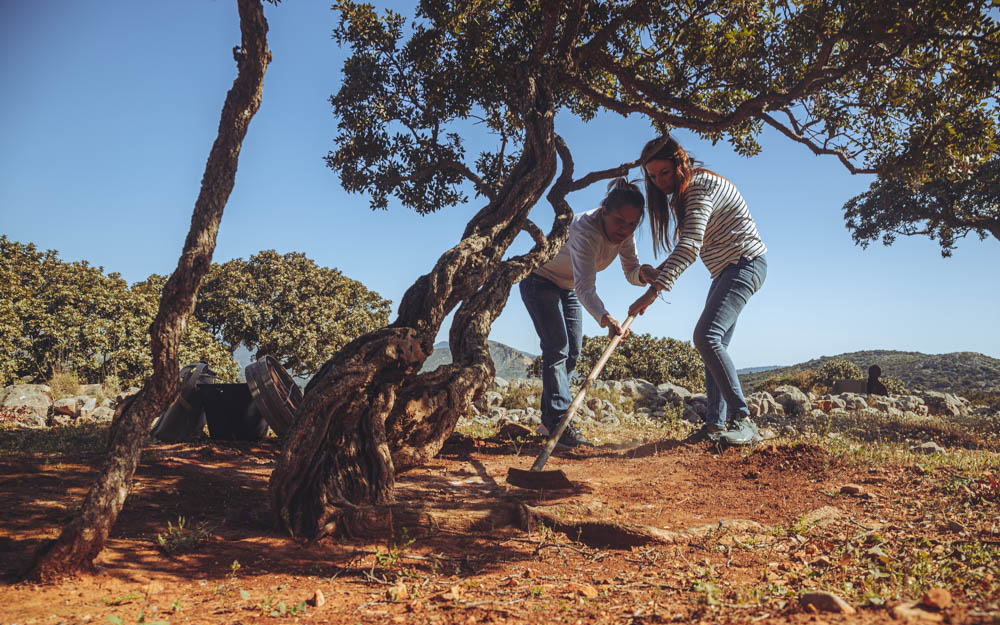For three days now, we have been fighting over who is going to drive. We flipped coins to decide. Except for the driver, the rest of us feel giddy because of the countless turns of this immense island’s curvy roads. Especially in the north. Whoever drives enjoys the new road network and the dramatic changes of the landscape. From the unknown Voreiochora (villages of north Chios), with the high mountains and the villages of five to ten inhabitants each, to Notiochora (villages of south Chios), the kingdom of mastic and of the fairytale Genoese settlements, it feels as if we have visited more than one islands.
This is Chios. An island different from the rest, very beautiful, somewhat difficult to explore, in any case unique. Mastic, tangerines and seamanship have determined the island’s fate over time. Exports ̶ of products and ship-owners ̶ actually made Chios more introverted. In regards to tourism, we could say this island is a product for internal consumption: for those who already know it, for those who come from here and maybe for the persistent visitors of the island.
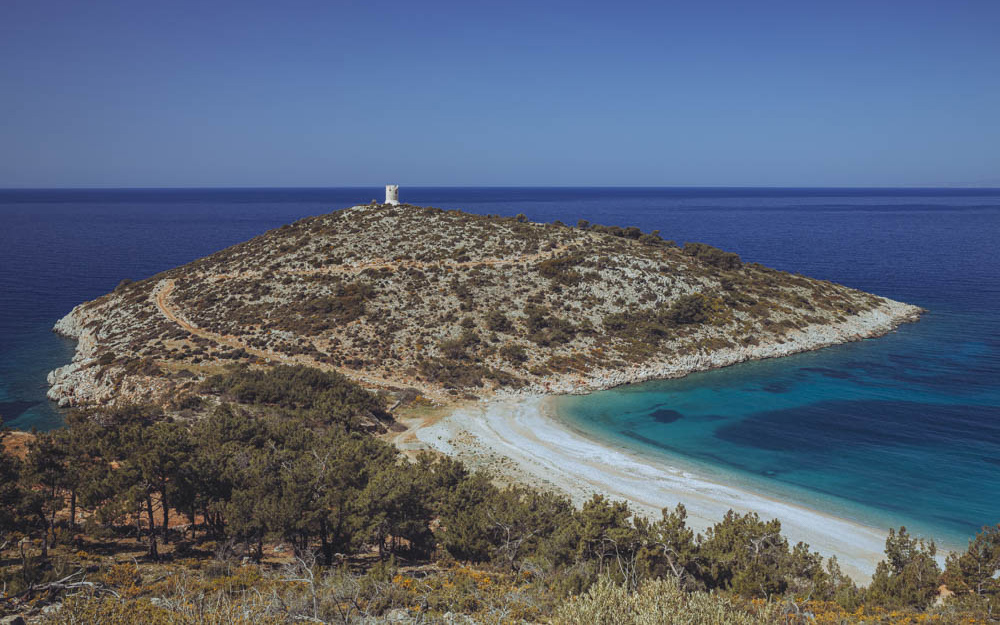
© Nikos Boutsikos, Nidibou Photography
On the one hand, we have the famous Pirgi with the painted “xista”, the geometric and natural black and white motifs on the walls that the French Jacques Lacarrière, a passionate admirer of ancient Greece, compared to playing cards for giants. But then, on the other hand, we have the charming, unknown village of Vessa or the most authentic Olympi.
On the one hand the monastery Nea Moni of Chios with the majestic mosaics, a UNESCO World Heritage Site and on the other, the unknown monastery Moni of Mounda, in the wilds of the north, with the rare depictions of the devil. The charming settlement of Anavatos, the Mistras of Chios as it is called, which has been deserted after the Massacre of 1822, but also Pitios, which is now trying to be reborn.
Amazing beaches, such as the famous Mavra Volia, but also unknown ones, where you are probably going to be completely alone, such as Trachili and its adjacent beaches, under the medieval observation towers of the island. The famous mastic and its unique cultivation in the world but also young small producers like Michalis Fetokakis, who cultivates aloe and produces juice out of it.
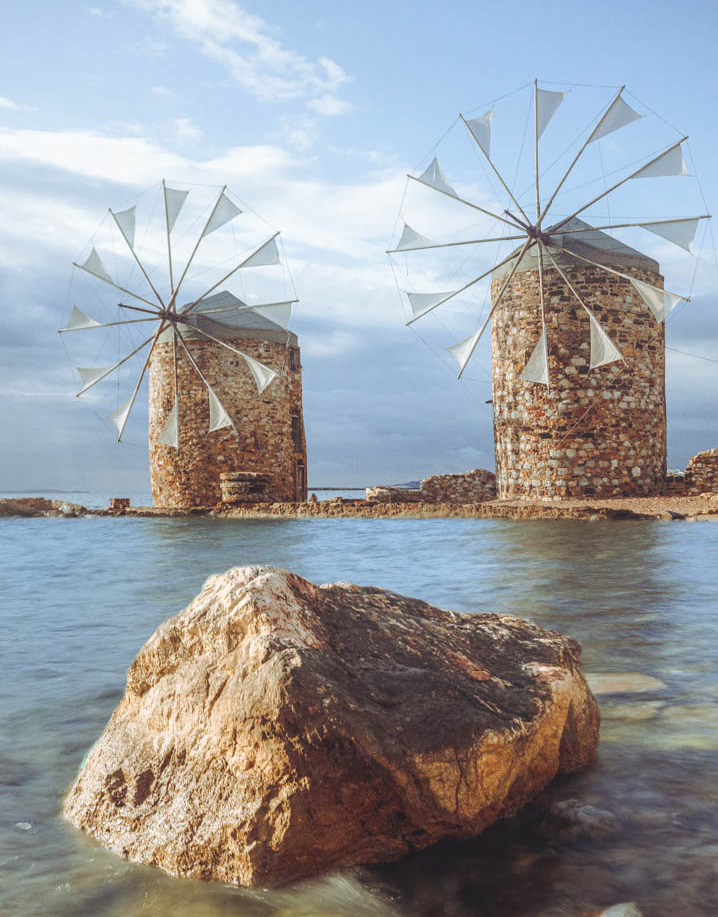
© Nikos Boutsikos, Nidibou Photography
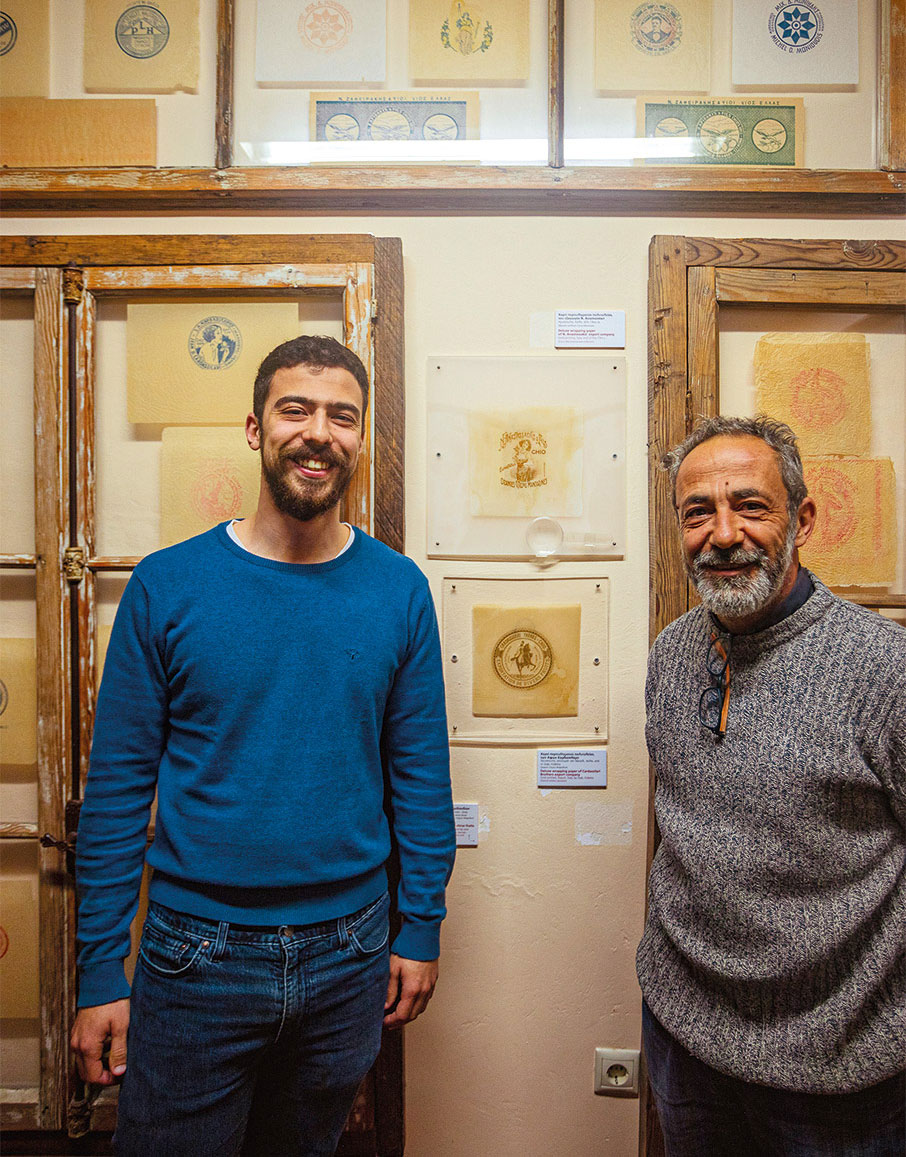
© Nikos Boutsikos, Nidibou Photography
Chios’ products are in abundance: all kinds of mastic products by the Mastic Producers Association, fruit preserves and jams made with citrus fruit from Kampos, wines (two wineries operate in the north), liqueurs, ouzos and Chian beers, mastelo and other delicious cheeses, even handmade pasta.
Ideal for hiking and agritourism, with notable music festivals at the same time, it also flirts with other types of tourism that are left, however, to private initiative.
George Missetzis, for example, has undertaken to highlight the great natural wealth, which includes over 100 species of orchids along with hybrids, George Halatsis has been trying for years to organize the paths and the author Giannis Makridakis organizes literary workshops in Volissos and free guided tours to the places where the stories in his books take place. Chios renews its identity. Chios has everything, and the main question is which of its qualities should we give emphasis to? I would dare to say to its uniqueness: mass tourism doesn’t suit this island, it has to build its own tourism model. Its very selectivity is the key.
10 + 1 Experiences
Time Travelling in Mesta
As soon as you face Mesta, the perfectly preserved medieval settlement that has been saved thanks to the restorations conducted by the Greek National Tourism Organization (GNTO) under Aris Konstantinidis, you will be stupefied. The most famous and beautiful of the mastic-producing castle-villages is a perfect example of fortification architecture created by the Genoese with the reoccupation of Chios back in the 14th century.
This is the result, like in all the mastic-producing villages’ cases, of a wonderful defense planning and communication network from the time when the Genoese company Mahona Giustiniani took over the exploitation of the island and the monopoly of mastic. Invisible from the sea, the village of Mesta is enclosed by the outer walls of its houses, which form a solid array around an eminent tower and are connected to each other by their rooftops. Labyrinthine alleys, galleries and votes (roof-ways connecting the houses of Chios) of all sizes create a complex network in a way that whoever would manage to enter the village by forcing the gate would get lost without a doubt, as you are going to.
Here, you will find the big church of Taxiarches, you will look for the temple of Micros Taxiarchis ̶ observe its magnificent iconostasis ̶ you will wish the disappearance of the cables and plastic chairs of the square and when it gets dark, you will enjoy the mystic atmosphere. Enjoy a cocktail at the unique Paxata bar for an atmospheric summer evening. .
Info
Mesta are located 35 km. from the city of Chios.
Paxata bar, Tel. (+30) 2271.076.517.
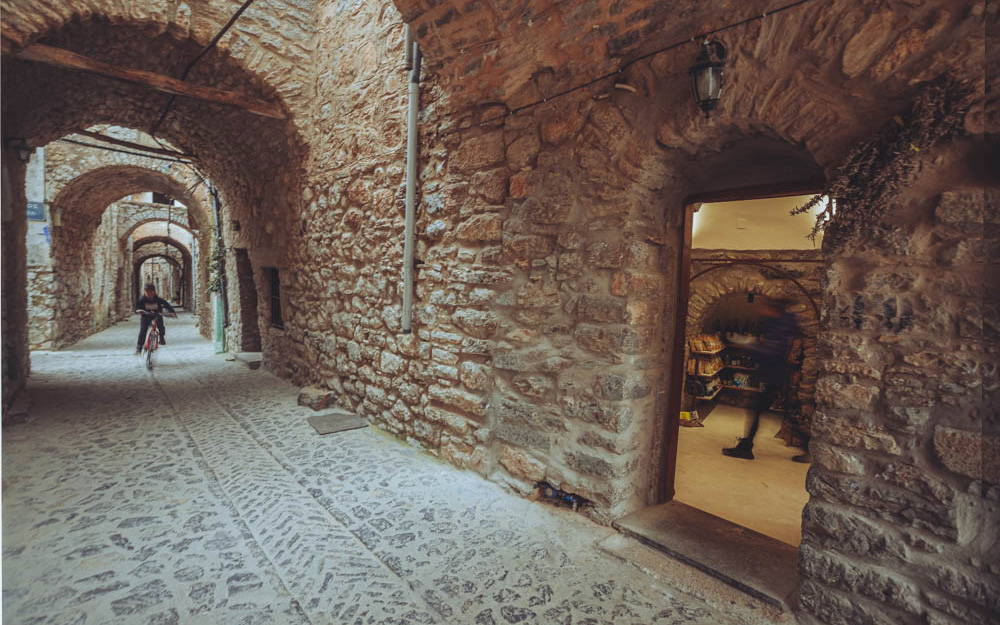
© Nikos Boutsikos, Nidibou Photography
Stories of Kampos
My room is the garden shed of Perleas Estate but it is the best. When I look out the window, I can see the water well, the huge cistern and an “ocean” of trees. Once I open it, I can hear the blackbirds and Ι almost get dizzy from the scents of laurel and citrus fruits ̶ oranges, tangerines, lemons, bergamots and sour oranges. Perleas, which now operates as a hotel, is one of the famous mansions of Kampos, dating back in 1640 and Vangelis Xidas, its hospitable host is a genuine anestatis (a person in charge of the upkeep of the gardens and groves).
Kampos, is a fragrant orchard of 200 hectares, where one of the most important parts of the island’s history was written, starting from the Genoese. Mansions with arched gates, made of the special stones from Thimiana, turn their backs on the road, erecting fences and rows of cypress trees to hide, unlike the rest of Greece, their wealth: incredible gardens, water wells-works of art, stone cisterns, pebble floors, marble stairs and blazons of the great families of the island. These are the estates of wealthy traders, the aristocracy of Chios, which are upkept and cultivated by the famous anestates.
At the end of the 19th century, the oranges and tangerines of Kampos could only be compared to jewelry: the workers even had their fingernails inspected before the harvest lest they hurt the fruits, the fruits were wrapped one by one in paper ̶ sometimes even in gold print ̶ were carefully stacked on special crates and traveled around the world as luxury goods. Today, about 40 mansions are still inhabited and apart from the Perleas Mansion, it is also worth visiting that of Karalis, which Vangelis Xidas, Giorgos Placotaris and the Ioannis S. Fafalios Foundation have turned into a Citrus Museum, where visitors have the chance of learning the special history of the area. In its wonderful courtyard Odysseas Xidas runs the charming Perivoli café while, under the same brand name, his family makes citrus fruit jams and preserves. This year, horse rides are also expected to be organized in Kampos.
Info
Perleas, Tel. (+30) 2271.032.217, perleas.gr, at 80 euros, breakfast included.
Museum and Garden, Tel. (+30) 2271.033.202.
Horse riding, Pantelis Manolakis, Tel. (+30) 693.084.5330.
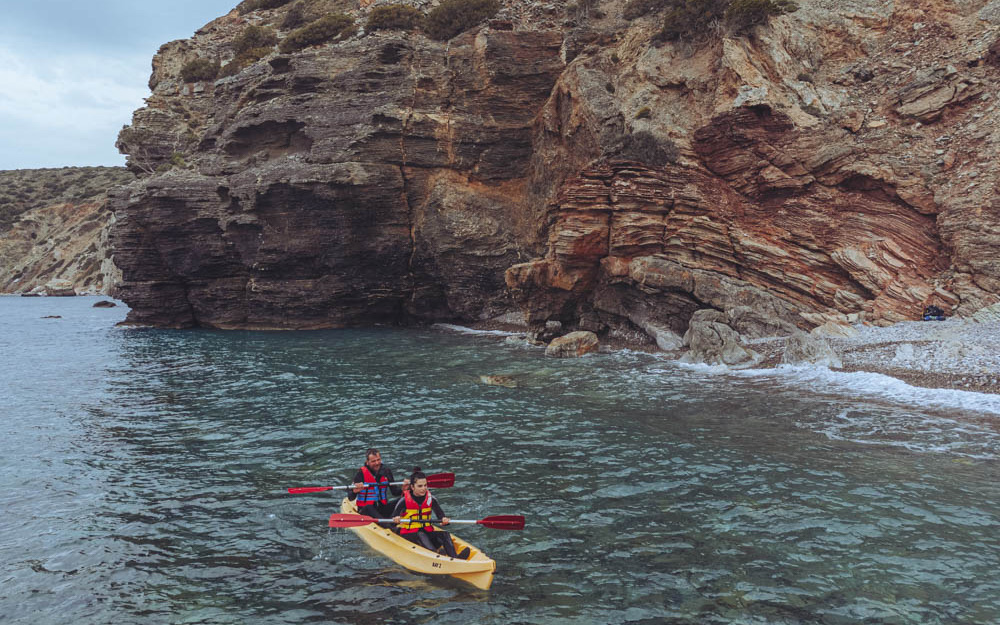
© Nikos Boutsikos, Nidibou Photography
Diving in Apothika
Apothika beach is located on the southwest coast of the island, it has deep waters and coarse sand and the main reason to visit it is Ectoras Giourgis, an ichthyologist, passionate about the sea and multitasker, who is going to teach you first of all the secrets of diving. “Western Chios stands out for its deep waters and impressive reefs. With the most experienced divers, we dive at the reef of Alkioni, between Chios and Psara, while beginners mainly observe marine organisms,” he says. Alternatively you can rent kayaks to explore the other three beaches in the bay. In any case, however, you will end up in his canteen, Tortuga, for cocktails and light meals overlooking the entire beach.
Info
Ectoras Giourgis, Apothika, Tel. (+30) 697.472.5459
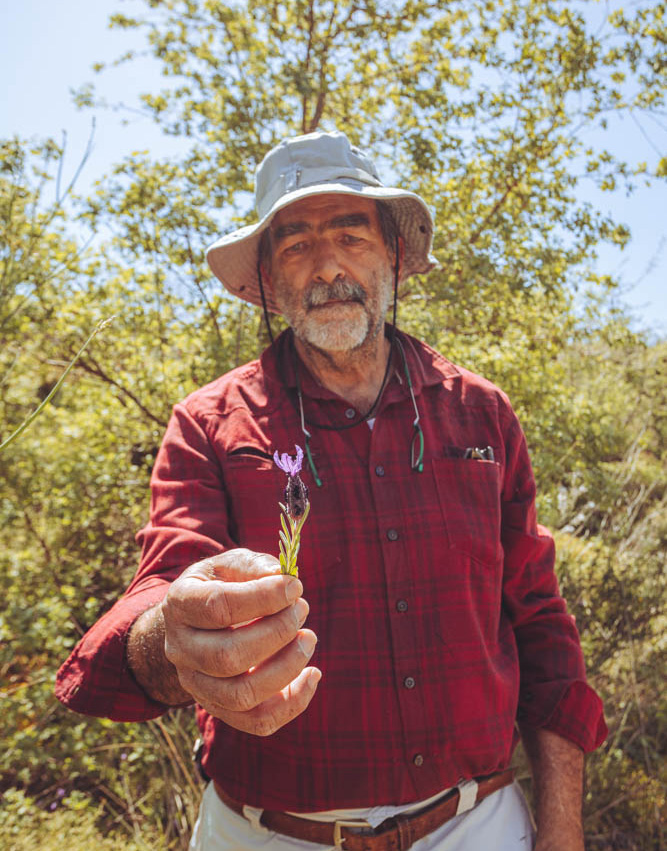
© Nikos Boutsikos, Nidibou Photography
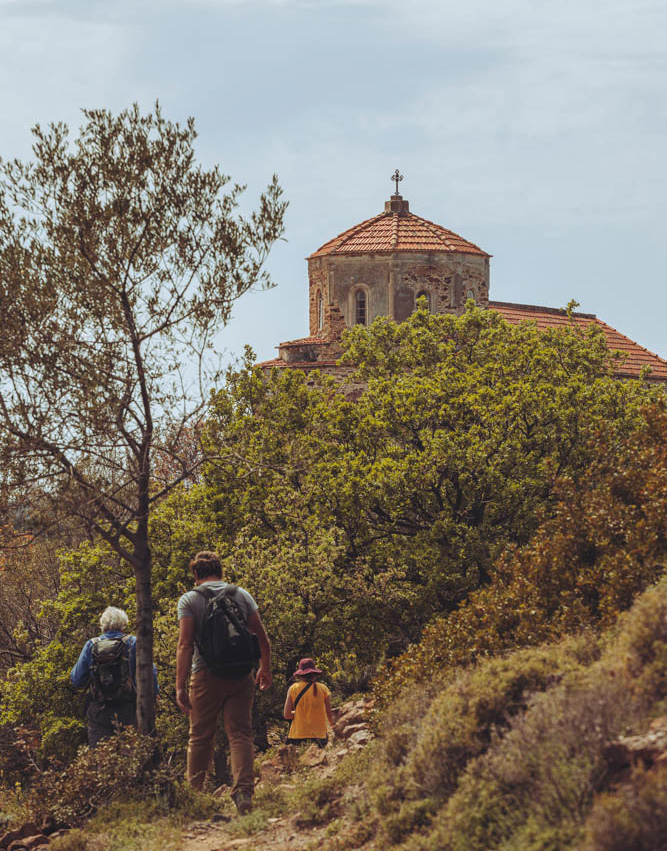
© Nikos Boutsikos, Nidibou Photography
Colors and Aromas
Why do they call Chios mirovolos (aromatic)? The ideal person to answer is Giorgos Missetzis, the naturalist who has been dealing with the rich flora of the island for 20 years. On the one hand the mastic and the citrus of Kampos, on the other more than 100 species of orchid, four species of wild tulip ̶ the so-called lalades ̶ but also a multitude of herbs.
Every spring, foreign nature lovers and researchers arrive in Chios and stay at Missetzis’ Spitakia (small cottages), in Avgonima village, to discover with him this colorful aspect of the island. Apart from hosting visitors in his guesthouse, offering homemade breakfast, he also has a rich collection of books that are available for the visitors, whom he also accompanies to the countryside to show them all the flowers they might be interested in. In the summer, when the flowering season ends, the organized hikes have a different… aroma: the herbs of Chios are put under the microscope and the baskets are filled with the special local oregano, thyme, savory, etc.
Info
Spitakia, Avgonima, Tel. (+30) 2271.042.702, spitakia.gr, at 90 euros, breakfast included.
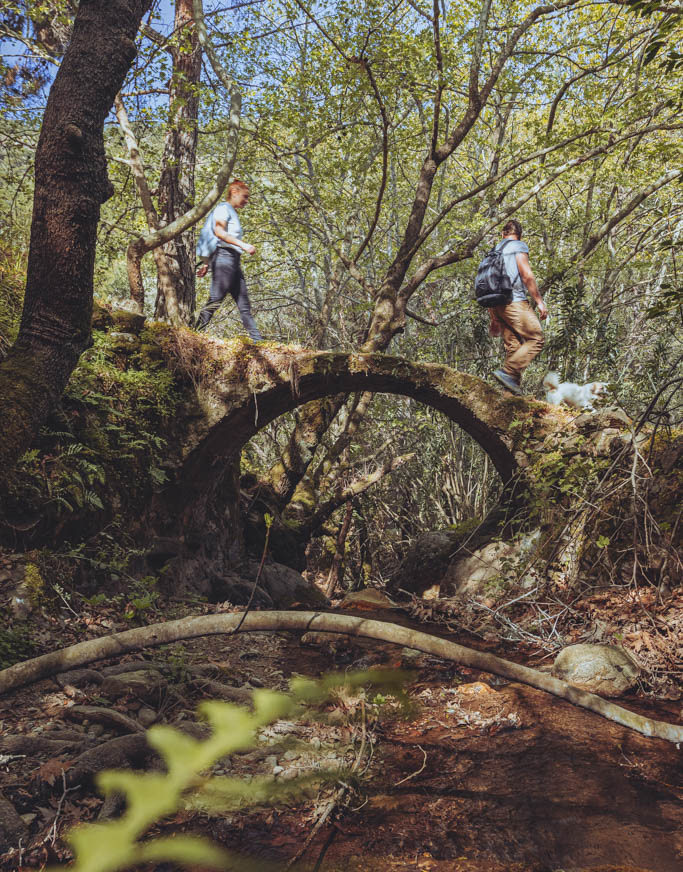
© Nikos Boutsikos, Nidibou Photography
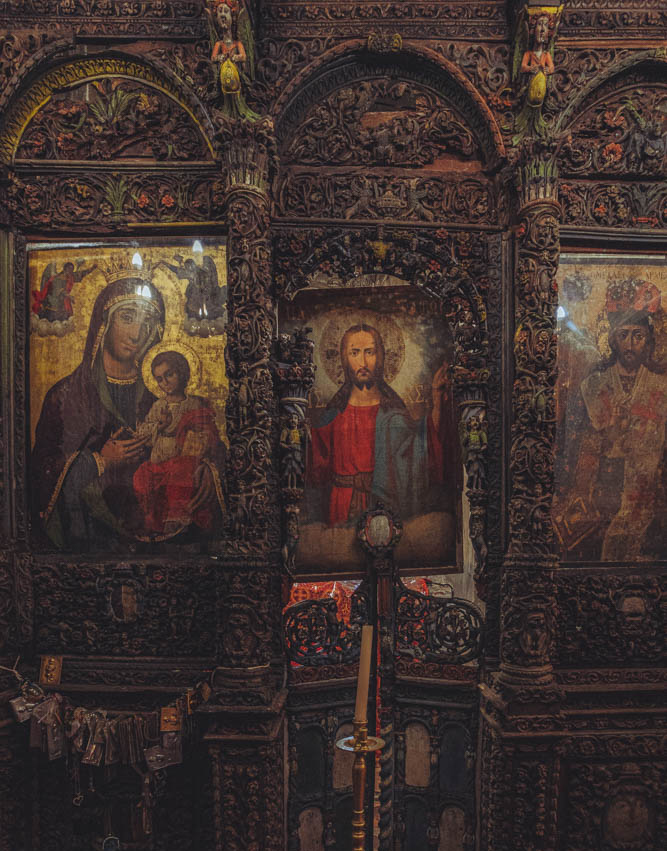
© Nikos Boutsikos, Nidibou Photography
The Paths of Chios
High mountains, gorges, beaches. Cobbled streets of the Ottoman rule, Byzantine passages and trails that only animals follow in the last years. Chios, with its rich nature and intense relief, seems like an ideal destination for hiking, but to our surprise this aspect of the island is not supported as much as it should be. This has been claimed for several years by the physical education teacher Giorgos Chalatsis, who has brought to light many routes. A tireless hiker who finds the meaning of life in nature, with hundreds of thousands of kilometers under his feet, made friends with shepherds, monks, old conductors, villagers ̶ all the people who gave him information about the old paths of the island – and who was treated with great suspicion, as he says, since the local community finds it difficult to understand, even today, what the meaning of his work is, given the fact that he is not making any profit.
Now, through Chios Trails Friends Association, he “recruits” young people, breathing love for nature into their hearts and teaching them how to clean and mark trails. The most famous trails are the gorge of Kampia (3km) and the cobbled path of the Ottoman rule from Fa to Lithi (1.5km), which together with six more trails emerged through a project funded by the Region. However, not all of them are properly maintained (in many cases we weren’t sure which trail we were supposed to follow while hiking in Volissos) therefore, while waiting for the hiking guide, Mr. Halatsis, you’d better ask the club to suggest well-marked routes, so that you do not get lost.
Info
Chios Trails Friends Association, Tel. (+30) 693.860.5179. Please also visit chioshiking.gr and trust the maps and applications of Anavasi Maps and Topoguide.
Mastic Growers for One Day
The mastic trees and their “tears” have been defining the rules in southern Chios for centuries. Thanks to mastic (among other things), Chios flourished, became rich, enjoyed special privileges, recorded in its assets stories of claims, multinational interests, smuggling and robbery attacks.
Fortified villages, castles and observation towers have been built for its sake. Even local songs or customs like that of the Agas in Mesta and Olympi have been inspired by it. You will learn about all this and other amazing things at the excellent Chios Mastic Museum in Pirgi, which belongs to the Network of Museums of the Piraeus Group Cultural Foundation. Depending on the season, you will have the chance to watch the Chians work: “In summer, the mastic trees are “embroidered” (incisions are made on their trunk), in autumn the women come together in the villages to pan and clean the mastic tears and in winter the trees are pruned”, says Roula Boura, who gives the opportunity to the visitors to become mastic growers for one day, showing them in the field the whole routine of cultivation and processing of mastic. Visitors “embroider” trees with her help, pan the mastic tears and learn how mastic became the center of social life in Notiochora.
Info
Chios Mastic Museum, Pirgi, Tel. (+30) 2271.072.212, piop.gr, daily from 10.00 to 18.00, except Tuesdays, Roula Boura, Tel. (+30) 697.355.8881
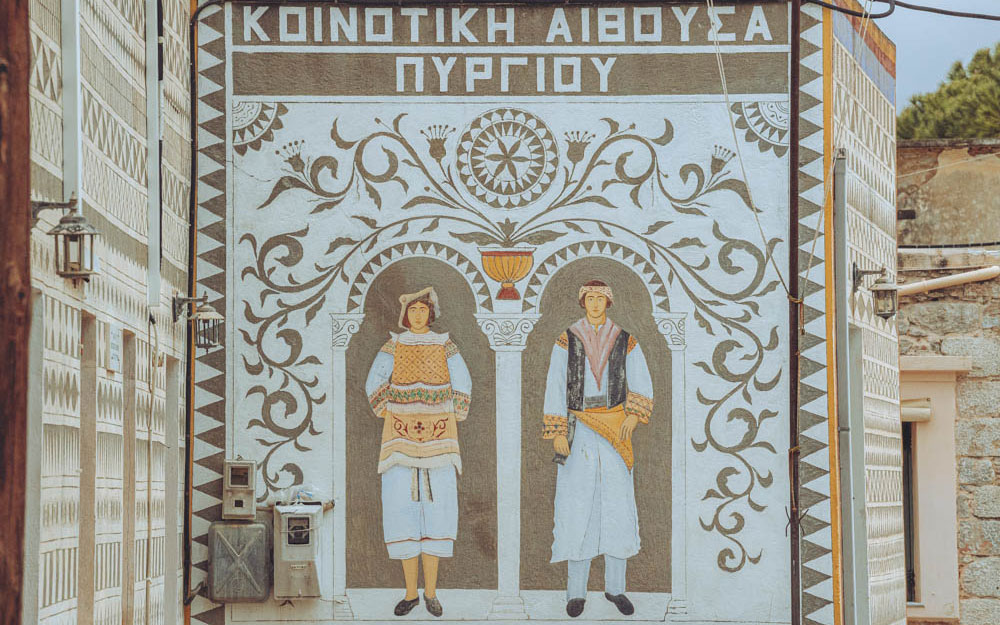
© Nikos Boutsikos, Nidibou Photography
Surprises in Aghio Galas
It’s hard to get here. You have to want it a lot or at least have the north as your base. However, in this special location, which is about 70km away from the city, with the equally special name Aghio Galas (Holy Milk), a green ravine with running water, outdoor activities for children, two visitable caves where human presence was located for the first time on the island (from the Neolithic Period) and the Byzantine church of Panaghia Aghiogalousaina are waiting for you to explore them. According to the legend, a king of Byzantium expelled his leprous daughter due to her illness and she lived here drinking the liquid that dripped from the cave (today’s holy water), which in fact healed her.
The church of Panagia dates back to the 13th century and the icon of Virgin Mary housed in it is considered rare, as she appears slightly smiling. What will impress you the most, however, is the 18th century wood-carved painted iconostasis, which depicts scenes from the Old Testament, lions, dragons, angels, topless mermaids and other figures, all pregnant. At the cultural center of Aghio Galas there is a cafe-restaurant in nature and gardens with organic vegetables that guests can collect. In the valley there are many activities for you to enjoy, from trampoline to zip line, while thematic exhibitions are also held from time to time.
Info
Aghio Galas Cultural Center, Anastasia Galatoula, Tel. (+30) 2274.022.004.
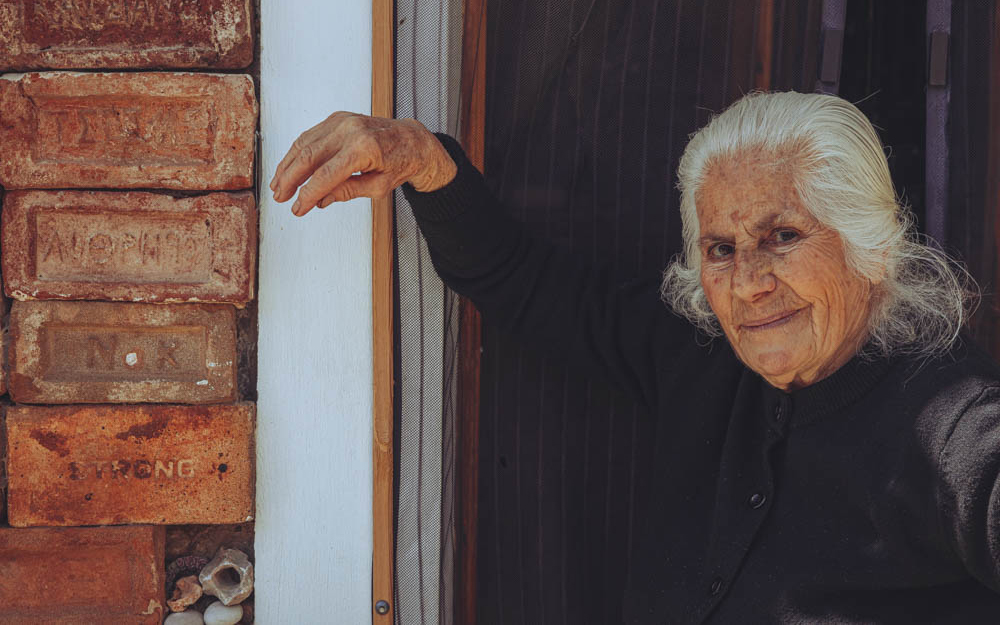
© Nikos Boutsikos, Nidibou Photography
Thermal Baths and Revels
During the day you can enjoy the thermal baths of Aghiasmata: use the facilities of the old-fashioned hydrotherapy center, where massage treatments are performed, or even better slowly plunge yourself in the rocky natural pool of the coast. The thermal water has a temperature of 57.5˚C and is considered therapeutic for rheumatism, arthropathy, sciatica, backache, neurological and gynecological diseases, etc. The people in the center will also talk to you about the positherapy in Lefkandria spring (21˚C-22˚C) which is said to be beneficial for the good health of the digestive system and nephrolithiasis.
Then you can ascend to Leptopoda: Inside the beautiful mountain village, which is kept alive thanks to its clubs and cottages that many Chians have built there, you will find the self-managed traditional cafe Empolo: old objects and exhibited products, nice atmosphere and spontaneous outbursts of revelry. However, if you prefer more action, you can discover the old antimony mines of the area or walk in the wonderful hiking network of Amani.
Info
Springs of Aghiasmata, Tel. (+30) 2274.021.979. Leptopoda is located 58km from the city of Chios.
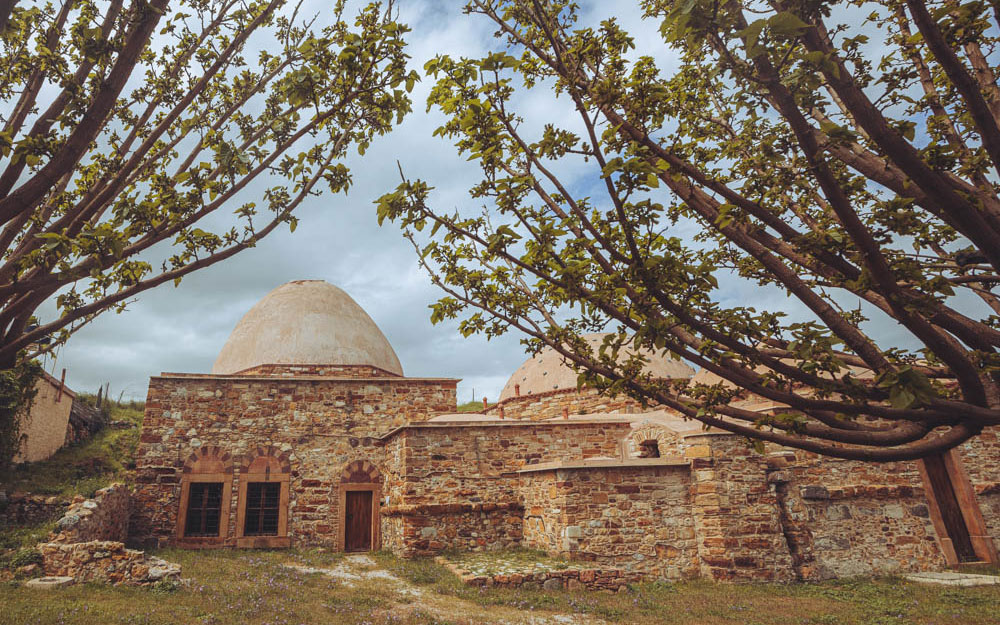
© Nikos Boutsikos, Nidibou Photography
Guided Tour of the Castle
Signs from Byzantine lords, Genoese conquerors, warlike Turks, Venetian “occupiers”, refugees from Asia Minor and modern inhabitants tell the story of the city in parts in the Castle of Chios. Enter through the impressive Porta Maggiore (main gate) and you will discover another face of the city. The Castle survived the great earthquake of 1881 ̶ the event that together with the Massacre of Chios marked the island. You will see the Giustiniani Palace (former administrative center of the Genoese rule that is used todays as an exhibition space), the Turkish cemetery, the Hamidiye Mosque, the restored hammams, the church of Aghios Giorgis (once Eski Mosque), the walls and bastions.
For a more personalized experience, you can contact the guide Thomas Karamouslis. With his special humor he will offer you an unforgettable tour.
Info
Thomas Karamouslis, Tel. (+30) 693.778.6213
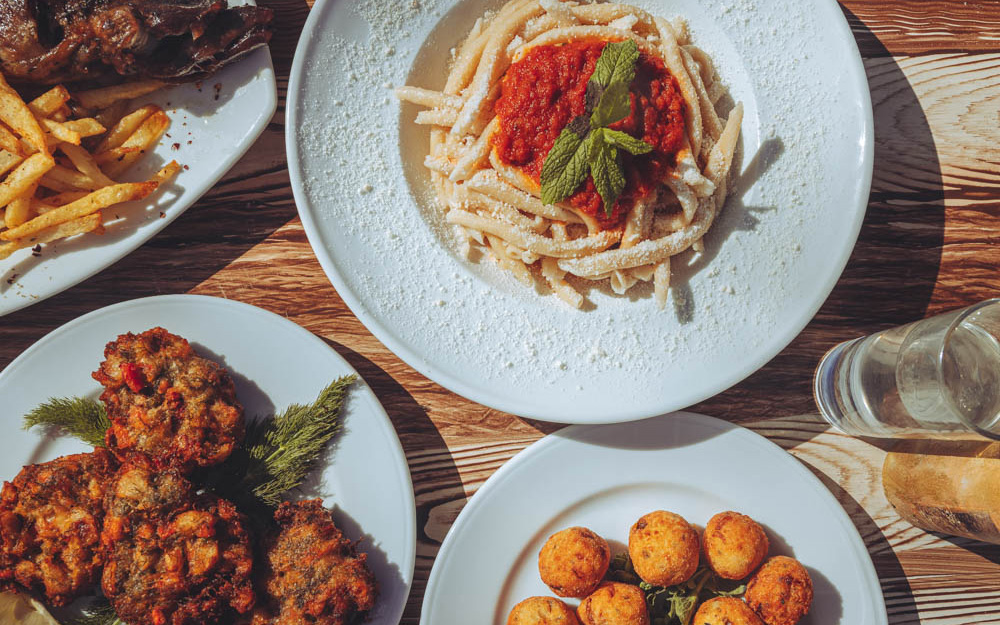
© Nikos Boutsikos, Nidibou Photography
Pitios: Tradition in QR Codes
“In Makelos, over the river, I am going to build a bridge / for you to cross, my love, to kiss you on the lips”, sings Mrs. Ioanna Merousi on the screen of our mobile phone. It appeared on our electronic device as soon as we scanned the QR code, one of the many that are hung on the walls of the village of Pitios. The agro-pastoral village with its rich history and its 40 inhabitants is not the most beautiful one in Chios, but it aspires to become a pole of attraction for visitors. The vision that is being put into practice, belongs to the former journalist Nikos Georgoulis, who founded a Social Cooperative Enterprise under the name “Destination: Pitios” and tries to activate the villagers as well.
You will learn the history of the village, which goes back to Homer’s time, through a free guided tour by a special guide in the summer, walking through the alleys to the windmill and the tower at the top (we hope it can be visited this year). You will definitely make a stop in Gaidourochora, a place where from this year on children will be able to “interact” with donkeys, these kindhearted animals, through educational programs, at Pitys Herbs for supplies of organic herbs and at the bakery of Mr. Giannis Apostolis, who kneads with Chian flour, bakes in his wood-fired oven and never stops joking with his customers. Conclude your visit with a meal at Makelos taverna, under the huge plane tree of the village, the history of which can also be learned via a QR code.
Info
Pitios is located 25km from the city of Chios.
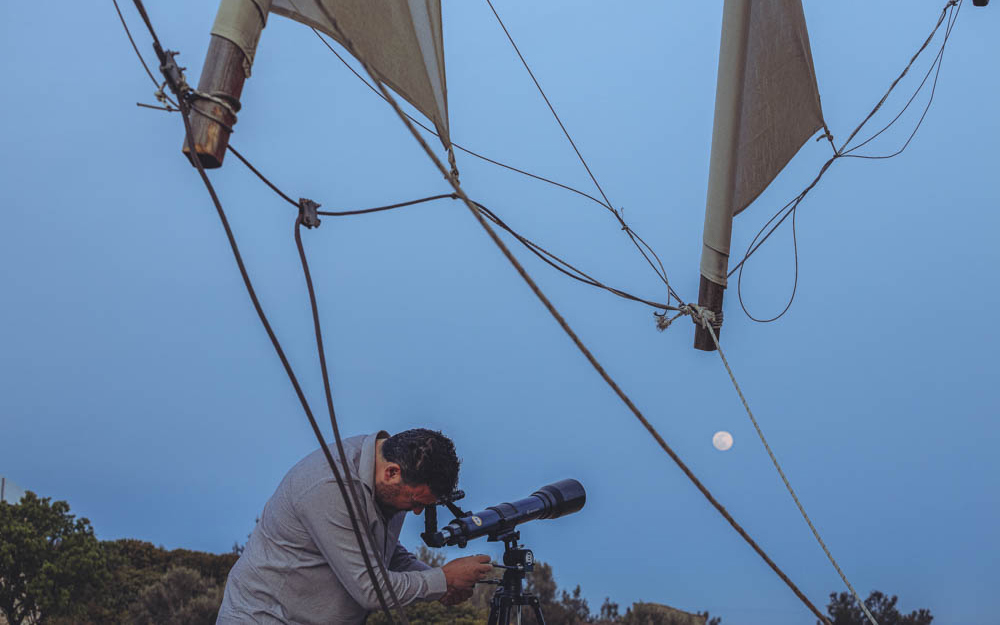
© Nikos Boutsikos, Nidibou Photography
Let’s Count the Stars!
“We will never forget an old man who came to a stargazing night in Aghios Galas. He was the first to come and the last to leave. He sat patiently speechless all night long. When we asked him, he said excitedly: “Thank you my children, it was my childhood dream to see the sky through a telescope.”
Thanks to Chios Astronomy Club, founded in 2012, all Chians and visitors of the island have the opportunity to spend one or more nights under the stars, since every summer it organizes an Astronomy Festival. Within its framework (or outside it) there are observations of celestial bodies and astronomical actions, even astrophotography lessons, acquainting the participants with the universe. Τelescopes are set up on beaches, villages, mountains and of course in northern Chios, which is considered to be one of the areas in Greece with the least amount of light pollution.
Info
For information, please visit the Facebook page: Chios Astronomy Club.

